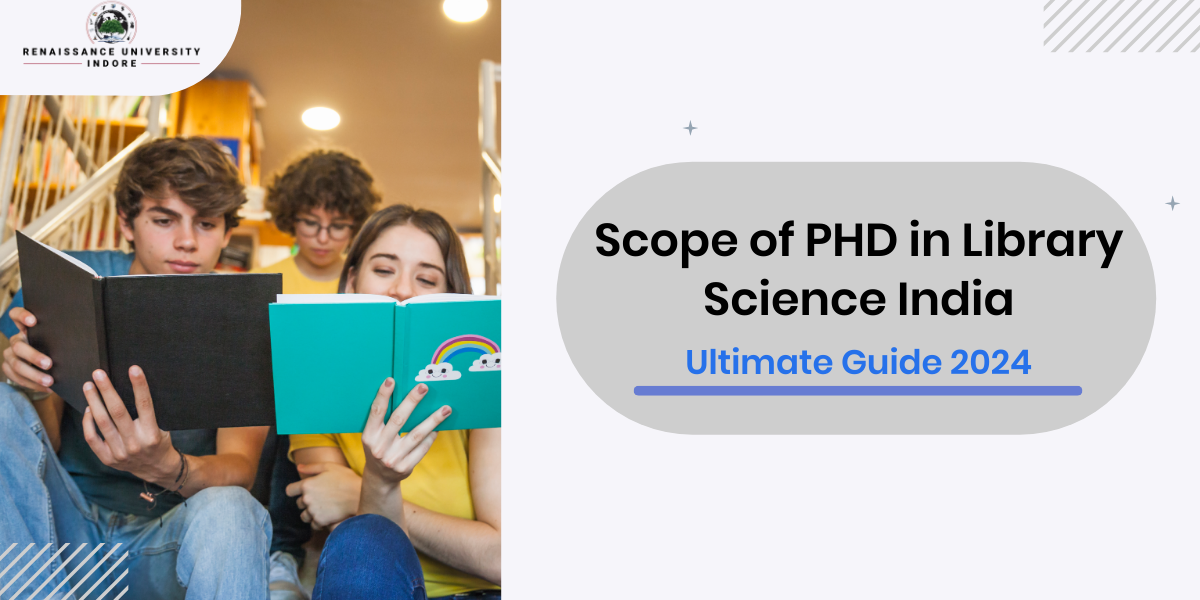A PhD in Library Science serves as a gateway to unparalleled opportunities. As we step into the year 2024, the relevance and scope of a Doctorate in Library Science in India have never been more significant. This ultimate guide aims to discover the scope of PHD in Library Science, shedding light on the vast possibilities it offers for aspiring scholars.
Understanding Library Science:
Library Science is a multidisciplinary field that involves the management and organization of information resources. It encompasses a wide range of skills, from cataloging and classification to information retrieval and preservation. As technology continues to shape the way we access information, the role of library professionals becomes even more critical in ensuring the efficient and effective use of resources.
Importance of a Ph.D. in Library Science:
A Ph.D. in Library Science signifies the highest level of expertise in the field. Doctoral candidates engage in advanced research, contributing new knowledge that can shape the future of library and information science. This level of specialization opens doors to leadership roles, teaching opportunities, and impactful contributions to the academic community.
Ph.D. Research Areas in Library Science
As technology continues to reshape the way we access and share information, Ph.D. researchers in Library Science find themselves at the forefront of innovation. This blog post delves into some fascinating and crucial research areas within the realm of Library Science that Ph.D. candidates are exploring.
-
Digital Libraries and Information Retrieval:
In the digital age, the concept of libraries has transcended physical boundaries. Ph.D. researchers are actively investigating ways to organize, store, and retrieve information in digital libraries efficiently. This includes the development of advanced search algorithms, metadata systems, and the exploration of semantic web technologies.
-
Data Curation and Management:
As the volume of data explodes, researchers are focusing on effective data curation and management strategies. This involves developing protocols for preserving and organizing data to ensure its accessibility, usability, and longevity. Ph.D. candidates are working on creating frameworks that balance the need for open access with the ethical considerations of data privacy.
-
Information Literacy and User Behavior:
Understanding how users interact with information is crucial for the design of effective library services. Ph.D. researchers are investigating information literacy programs and studying user behavior to enhance the design of user-friendly interfaces, information-seeking behavior, and the impact of information literacy initiatives on diverse user groups.
-
Archives and Preservation:
Preserving cultural heritage and historical documents is a timeless endeavor. Ph.D. candidates are involved in researching cutting-edge techniques for digitizing and preserving archives. This includes exploring the use of artificial intelligence for document restoration, as well as the development of sustainable preservation practices.
-
Knowledge Organization and Taxonomies:
Creating meaningful structures for organizing information is a perennial challenge. Ph.D. researchers are delving into knowledge organization systems, including the development of taxonomies, ontologies, and controlled vocabularies. This research area is critical for improving the efficiency and accuracy of information retrieval systems.
-
Open Access and Scholarly Communication:
The shift towards open access in scholarly communication is a transformative trend. Ph.D. candidates are investigating the impact of open access on knowledge dissemination, academic publishing, and the evolving role of libraries in supporting open scholarship. This research area also explores issues related to copyright, intellectual property, and the economics of open access.
-
Social Justice and Inclusivity in Information Access:
Libraries play a vital role in ensuring equitable access to information. Ph.D. researchers are exploring ways to address information disparities and promote inclusivity. This includes studying the impact of library services on marginalized communities, advocating for accessible design, and developing strategies to bridge digital divides.
Scope of Ph.D. in Library Science
While library science might conjure images of traditional libraries, the scope of this field has expanded significantly in recent years. Let’s delve into the extensive and promising scope of pursuing a Ph.D. in Library Science in India.
-
Evolution of Library Science:
To comprehend the scope of a Ph.D. in Library Science, it’s crucial to understand the evolution of this field. Traditionally seen as the custodian of books and information, library science has transformed into a multidimensional domain encompassing digital archives, information management, and technology integration.
-
Research Opportunities:
A Ph.D. in Library Science opens up avenues for groundbreaking research. Scholars in this field can explore diverse topics, such as information retrieval systems, digital libraries, preservation techniques, and user behavior analysis. The research outcomes contribute significantly to the enhancement of library services and information management strategies.
-
Technological Integration:
With the advent of technology, libraries are no longer confined to physical spaces. A Ph.D. in Library Science equips scholars with the skills to integrate cutting-edge technologies, such as artificial intelligence, machine learning, and data analytics, into library systems. This ensures that libraries remain at the forefront of information dissemination in the digital age.
-
Role in Academia:
The academia beckons for Ph.D. holders in Library Science. Universities and research institutions value experts in this field to impart knowledge to aspiring librarians and information professionals. Moreover, they play a pivotal role in shaping the curriculum to meet the dynamic needs of the information industry.
-
Information Management in Corporate Sector:
Beyond traditional library settings, corporations are recognizing the value of information management experts. Ph.D. graduates in Library Science are well-equipped to navigate the complexities of organizing, storing, and retrieving information efficiently. This skill set is invaluable in sectors where data-driven decision-making is paramount.
-
Cultural Heritage Preservation:
Libraries serve as custodians of cultural heritage. A Ph.D. in Library Science allows scholars to delve into the preservation of rare manuscripts, archival materials, and historical records. This not only safeguards cultural assets but also contributes to the understanding and appreciation of diverse histories.
-
Global Collaborations and Networking:
Pursuing a Ph.D. in Library Science opens doors to global collaborations and networking opportunities. Scholars can engage with international conferences, collaborate on research projects, and contribute to the global discourse on information management and library science.
-
Policy Development and Advocacy:
Ph.D. graduates in Library Science often find themselves at the forefront of policy development and advocacy. Their expertise is crucial in shaping policies related to information access, intellectual property, and digital literacy, influencing the broader socio-economic landscape.
In 2024, the scope of a Ph.D. in Library Science in India transcends traditional perceptions. From research and academia to technology integration and cultural preservation, pursuing a Ph.D. in this field opens up a lot of opportunities. As the world becomes increasingly reliant on information, the role of library science experts becomes ever more critical, making this a compelling and dynamic field for those with a passion for knowledge and its organization.
Admission Requirements for a Ph.D. Program in Library Science
Before one can immerse themselves in this academic odyssey, it is imperative to navigate through the admission requirements that serve as the gateway to this enriching experience.
-
Educational Qualifications:
The cornerstone of any Ph.D. program is a strong educational foundation. Prospective candidates are generally required to possess a master’s degree in Library Science or a related field. Some institutions may also consider candidates with a master’s degree in a different discipline if they can demonstrate a clear connection between their prior studies and library science.
-
Research and Writing Skills:
An integral aspect of any doctoral program is the ability to contribute original research to the field. Prospective Ph.D. candidates should showcase their research and writing skills through a writing sample or a master’s thesis. This serves as a testament to their ability to engage with scholarly literature, articulate research questions, and present findings coherently.
-
Professional Experience:
While not universally required, many Ph.D. programs in Library Science value practical experience in the field. Candidates with prior professional experience in libraries or related information institutions bring a valuable perspective to the academic environment. This experience can be highlighted in the application through letters of recommendation, a resume, or a statement of purpose.
-
Letters of Recommendation:
Strong letters of recommendation are crucial for securing admission to a Ph.D. program. Academic references who can speak to the candidate’s intellectual capabilities, research potential, and commitment to the field are highly beneficial. These letters should provide insights into the candidate’s academic and professional qualities, emphasizing their readiness for doctoral-level work.
-
Articulating Academic Goals:
A well-crafted statement of purpose is a key component of the application package. It should clearly articulate the candidate’s research interests, academic goals, and the alignment of these with the specific strengths and offerings of the program. The statement of purpose serves as a personal narrative, allowing the admissions committee to understand the candidate’s passion and purpose in pursuing a Ph.D. in Library Science.
-
Standardized Tests:
Some Ph.D. programs may require standardized test scores, such as the GRE (Graduate Record Examination). While not all programs have this requirement, candidates should be aware of the specific expectations of the institutions they are applying to and prepare accordingly.
-
Interviews:
In some cases, prospective candidates may be invited for interviews as part of the admissions process. This serves as an opportunity for the candidate to discuss their research interests, academic background, and goals with faculty members. It also allows the admissions committee to gauge the candidate’s fit within the program.
Embarking on a Ph.D. journey in Library Science is a transformative experience that demands a comprehensive understanding of the admission requirements. Prospective candidates should carefully prepare their application packages, highlighting their educational achievements, research skills, professional experiences, and aspirations in the field. By successfully navigating the admission process, individuals can open the door to a world of academic exploration and contribute meaningfully to the ever-evolving landscape of Library Science.
How long does it take to complete a Ph.D. in Library Science in India?
The duration to complete a Ph.D. in Library Science in India varies based on several factors, including the university’s regulations, the candidate’s research progress, and the intricacies of their chosen topic. Typically, the program spans a minimum of three years, with candidates engaging in comprehensive coursework during the initial phase. Subsequently, the focus shifts towards intensive research and the development of a doctoral thesis. The actual time taken can extend beyond the stipulated period, often influenced by the complexity of the chosen research subject and the thoroughness required for a meaningful contribution to the field. Additionally, factors such as access to resources, mentorship, and the candidate’s commitment play pivotal roles in determining the overall duration. Therefore, while some may complete their Ph.D. within the conventional timeframe, others may require additional years to ensure the quality and depth of their scholarly work.
Curriculum for a Ph.D. in Library Science
Let’s delve into the key components of an innovative and forward-thinking curriculum for a Ph.D. in Library Science.
Core Competencies:
- Foundations of Library Science:
- An in-depth exploration of the historical, theoretical, and philosophical foundations of library science.
- Examination of the evolving role of libraries in society, with a focus on social, cultural, and technological changes.
- Research Methodologies:
- Rigorous training in qualitative and quantitative research methodologies to equip students with the tools to conduct advanced scholarly research.
- Integration of interdisciplinary approaches to address complex issues in the field.
- Information Organization and Retrieval:
- Advanced study of cataloging, classification, and metadata creation.
- Emphasis on developing innovative methods for information organization to enhance accessibility and retrieval.
- Digital Libraries and Information Technologies:
- Exploration of emerging technologies shaping the future of libraries, including artificial intelligence, blockchain, and data analytics.
- Hands-on experience with designing and managing digital libraries.
- Collection Development and Management:
- In-depth analysis of collection development policies and strategies to meet the diverse needs of library users.
- Examination of ethical considerations in the acquisition, preservation, and deaccessioning of library materials.
Specialized Tracks:
- Archives and Preservation:
- Specialized coursework on archival theory, preservation techniques, and digital archiving.
- Practical experience in managing and preserving cultural heritage materials.
- Information Literacy and Education:
- Comprehensive training in designing and implementing information literacy programs.
- Focus on pedagogical methods to educate diverse user groups.
- Data Science for Libraries:
- Integration of data science principles to analyze and interpret library usage data.
- Application of data-driven decision-making in library management.
- Public Libraries and Community Engagement:
- Study of community outreach strategies and the role of public libraries in fostering civic engagement.
- Practical experience in developing and implementing community-focused library programs.







